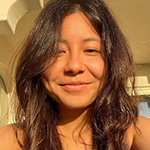Nicola Wong

As this summer comes to an end, I am very appreciative of my time at the Welcome Water Protector Center (WWPC) in Aitkin County, MN. Situated near ‘Line 3,’ on the Mississippi, the Welcome Water Protector Center is a community space for arts and education that foregrounds Indigenous wisdom, in defense of the environment.
Originally founded by ‘Honor The Earth,’ a prominent environmental justice organization in Minnesota, the WWPC is in a stage of reimagining their work and vision to encompass more preventive care. Healing from the intense distress Line 3 has caused, they are prioritizing regenerative practices such as tending to a new community garden, nurturing artists and researchers via on-site residencies, and organizing interactive events and activities that give insight into surrounding ecosystems.
As someone that values time in nature and community engagement, the Welcome Water Protector Center has given me a strong sense of inspiration. Connecting to water protectors, farmers, activists, musicians, writers, film makers, etcetera… has continued to affirm my desire to resist oppressive, extractivist systems via intentional living and creativity. My main focus at the WWPC was in communications, so getting to know the community by attending, working, or speaking at events across the state. Over the course of this summer, I was involved in range of events such as the annual Aitkin County Rivers and Lakes Fair, a tour of Winona’s Hemp and Heritage Farm, a Twin Cities community art share and concert, and ‘Common Ground,’ a talk at the Walker Art Center, just to name a few.
When I was not staying at the WWPC, or camping along the Mississippi for an event, I was in the cities, working to curate Welcome’s online presence via a site that contains information on their mission, their ongoing initiatives, and useful resources and networks. To accompany this project in media design, I made an informational zine that gives an overview of the Welcome Water Protector Center and some takeaways from their most recent event, a medicinal foraging walk.
Having the opportunity to participate in conversations around how we care for our waterways, and just gaining exposure to more cooperative strategies and structures in their work of activism, was especially transformative. Moving forwards, I want to continue finding ways to integrate my efforts in raising environmental awareness, into my studies of anthropology and traditional, more integrative medicine. I’d love to stay involved and continue to support this vibrant community however I can.